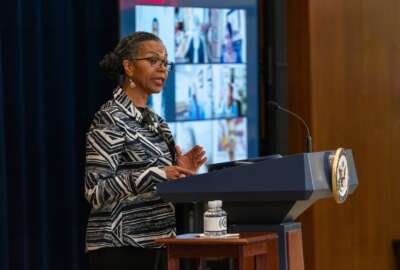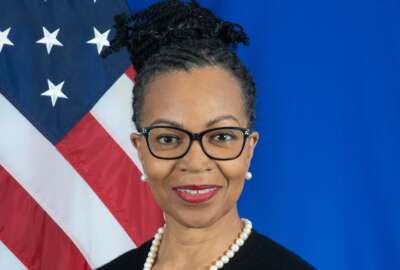State Dept’s departing diversity chief expects DEIA programs to outlast rollback attempts
The State Department put a spotlight on one of the Biden administration's top federal workforce priorities, when it named its first chief diversity and inclusion...
The State Department put a spotlight on one of the Biden administration’s top federal workforce priorities, when it named its first chief diversity and inclusion officer.
Secretary of State Antony Blinken named Amb. Gina Abercrombie-Winstanley, a career diplomat with more than 30 years of experience, to serve in this elevated role in May 2021.
More than two years later, Abercrombie-Winstanley is stepping down from the role, and leaving government service this Friday.
But in an exit interview she told Federal News Network she expects the department’s diversity, equity, inclusion, and accessibility work will outlast attempts to roll back DEIA programs across government.
“Equal opportunity, fairness, a level playing field — these are American values and ideals. We have to be careful how we talk about them, perhaps so that people understand it, why it is an American ideal, [but] it’s not going anywhere,” Abercrombie-Winstanley said.
While a comprehensive spending plan for fiscal 2024 has yet to come into focus, members of the House Appropriations Committee advanced a spending bill that would defund “unnecessary and polarizing” DEIA training and programs at the Department of Veterans Affairs.
Former President Donald Trump signed an executive order in September 2020 that banned federal agencies and contractors from conducting some diversity training, but President Joe Biden repealed that executive order in his first week in office.
Abercrombie-Winstanley, in a recent interview, touted the success of the department building out its data expertise to better address DEIA and workforce issues.
The State Department, following the release of its DEIA strategy last year, holds disaggregated workforce data sets that break down the composition of its workforce across nearly every one of its offices.
Abercrombie-Winstanley said that workforce data helps leadership pinpoint where and how the department is falling short of its goals, and how to get the agency on the right track.
“You cannot judge any progress or know where your problems lie without that data. And when you’re trying to convince people to make changes, and they are highly resistant … the data helps convince people when they see it in black and white,” she said.
House Republicans have pushed back on the State Department’s DEIA priorities at a hearing earlier this month, but Abercrombie-Winstanley said the department’s DEIA goals will remain a priority beyond her tenure and will continue across multiple administrations.
“People talk about DEIA now not as a mystery, or just an annoyance, but something that they want to know where to do it, how to do it,” Abercrombie-Winstanley said.
Abercrombie-Winstanley said DEIA goals aren’t just a priority for the current administration, but part of broader workforce issues where department employees are demanding change.
Abercrombie-Winstanley told members of the House Foreign Affairs Committee earlier this month that the department intends to address allegations of “toxic conduct” in a recent workforce survey.
More specifically, Abercrombie-Winstanley said nearly 50% of respondents reported experiencing bullying or harassment at the department within the past five years.
About 80% of respondents said they didn’t expect the department would take action.
Nearly 9,000 employees — about a third of the department’s direct hires — responded to the survey. Respondents said their top recommendation was to remove barriers to merit-based promotion.
Abercrombie-Winstanley said those results are “devastating,” but added that the root cause is department managers and supervisors not doing enough to advocate for their employees.
She added that the department has made it “not a nice-to-have, but an absolute need” for managers and supervisors to demonstrate progress toward DEIA goals as part of their performance reviews.
Those poor management skills, she added, also translate into employees not believing in the fairness of hiring and promotion decisions.
“Accountability is saying that you will be promoted if you manage well — if you look after all of your staff, not just the ones who remind you of you with whom you share background, or kindred interest, or the same school or hometown or whatever. You need to look at those who aren’t like you,” she said.
To address these problems, the State Department is bringing transparency to the process of hiring for deputy assistant secretary positions, which Abercrombie-Winstanley said was a “stepping stone” to even more senior positions at the department.
“We discovered that we did not advertise those positions. You had to be in the know. Somebody had to know and like you, and tap you on the shoulder to get you to come and do that job. So we changed that. The workforce said we don’t believe this is equitable, it definitely isn’t transparent. We made it transparent.”
The department is also conducting several barrier analyses, and taking a closer look at the data to determine which applicants receive an interview for vacant positions, and who receives those jobs.
The State Department is looking for additional funding to expand its data analytics capabilities in its fiscal 2024 budget request.
The funds would bolster the department’s Center for Analytics, its central hubs for all things data, as well as the data capabilities of the CDIO’s office, which is already swamped with requests for data.
“Congress has put forward 24 different requests for data for the Department of State. So even before I touch anything that we have to do, I got 24 different reports that I have to do for Congress,” Abercrombie-Winstanley said.
Abercrombie-Winstanley said a level playing field for promotions is benefiting State Department employees from all backgrounds.
“I say very frankly, if not diplomatically, every white guy is not in the ‘in’ crowd,” she said. “We’re not trying to put a new group at the top. We’re trying to level the playing field for everyone.”
The department has also made it a best practice for a panel of senior officials to make hiring and promotion decisions.
“It has built far greater trust and confidence in the decisions, because it wasn’t just one person making that decision, that there was a panel that every applicant was asked the exact same question.”
While the State Department is diversifying its entry-level workforce and bringing in a new generation of diplomats through new fellowship programs, more work is needed to diversify its higher ranks.
Abercrombie-Winstanley said over 80% of senior positions at the State Department are held by European-Americans, and that more than half 50% are held by men.
“Our best diversity is at the bottom of our pile, quite frankly. It is as you go up the ladder that it thins out … In some ways, there isn’t a lot to choose among at the senior levels, because we’ve lost so many along the way.”
The department is taking a closer look at workforce retention.
Abercrombie-Winstanley said the department is standardizing exit interviews with diplomats who leave midway through their careers, and tracking incidents in which diplomats may feel like “second-class citizens” in overseas posts.
“In some countries, it happens because you’re brown. In some countries, it happens because you have a disability. It happens because of your sexual orientation and gender identity. And it happens because you’re female. We are getting stories in from all of those groups, and what the mission is going to protect them — to stand for them, as they do for every other member of staff.”
The State Department earlier this year also loosened longtime restrictions barring some employees from serving in certain overseas posts, based on their ethnic background.
Abercrombie-Winstanley said the department has eliminated assignment restrictions based on an employee’s identity. However, she added that those restrictions decisions “were based on items that showed a vulnerability or something else.”
“it isn’t, strictly speaking identity, because we have people from every background serving in different places around the world,” she said.
The State Department precluded some diplomats from working on specific regional issues when they owned property or assets in another country, or if they had immediate family members living abroad.
Rep. Andy Kim (D-N.J.), a former diplomat who served both domestically and abroad, said his treatment as a Korean-American working at the State Department influenced his decision to leave.
Kim recalled receiving a letter during his tenure, prohibiting him from working on policy issues related to the Korean peninsula.
Abercrombie-Winstanley said the department’s use of assignment restrictions was having a chilling effect on State Department employees bidding on certain posts or assignments, based on their race or ethnicity.
“That means we’re losing something important, something vital. If they came with a language, personal knowledge, for whatever reason, and they didn’t bid on the post, we have lost their contributions to America’s foreign policy,” she said.
She said that was a “huge reason” for Secretary Blinken decided to loosen those restrictions in a memo earlier this year.
“We have to make sure that they have the information early enough that people coming into the State Department, who are bidding on assignments, understand what that process is, so that isn’t as much upset or last-minute kerfuffles.”
Copyright © 2025 Federal News Network. All rights reserved. This website is not intended for users located within the European Economic Area.
Jory Heckman is a reporter at Federal News Network covering U.S. Postal Service, IRS, big data and technology issues.
Follow @jheckmanWFED






